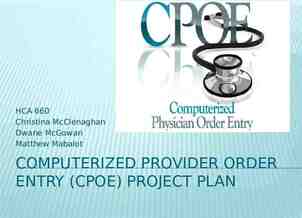DISABILITY PLANNING FOR HEALTH CARE 1
45 Slides2.24 MB

DISABILITY PLANNING FOR HEALTH CARE 1

Introduction More important than property matters as impacts client’s medical care and thus quality of life. Life and death decisions included. 2

STATUTORY SURROGATES 3

Statutory Surrogates What happens if no planning done and no guardian has been appointed? Health & Safety Code Chapter 313 provides list of decisionmakers. 4

Priority List UPDATE NEWSTATUTE Spouse Adult children. Parents. Nearest living relative. Physician not involved in patient’s medical treatment. Note: Statute does not resolve issue if children or parents disagree. 5

Prohibited Decisions Remove life support Authorize Inpatient electroshock mental health services Delegation of decision-making authority 6

Discussion Questions Are family members the right people to be default decisionmakers? Are your family members according to the priority list the people you would want making decisions for you? 7

MEDICAL POWER OF ATTORNEY [health care proxy] [advance directive] 8

Historical Background Common Law Medical decisions non-delegable Modern Law Started with California in 1983 Virtually all states now allow either with their own acts or adoption of Uniform laws 9

Texas Statutory Form 10

Texas Statutory Form Comments Must be in substantially the statutory form. Only a few states have this requirement. Name agent and alternates. Opportunity to provide detailed instructions. Mandatory Notarized disclosure statement. or two witnesses. 11

Special Concerns Select agent carefully Life-changing and life-ending decisions may be made. Discuss with agent your thoughts so agent can do a good job of making substitute decisions. Consider special instructions for any particular desires you may have. 12

13

Will Drafts Due 14

What did you do? 15

Were you arrested? 16

Is there evidence you did something your mom and future employers should not see? 17

Did you get engaged or married? 18

Reminders Disability Planning for Health Care Interview Audra Apke Pedro Gonzales-Cruz Disability Plan for Property Due 19

DISABILITY PLANNING FOR HEALTH CARE [CONTINUED] 20

Review Statutory Surrogates No planning decision-makers Medical Power of Attorney Planned decision-makers 21

HIPAA AUTHORIZATION [Heath Insurance Portability and Accountability Act] 22

Basic Issues Can medical agent get needed information? Split of opinion MPA is sufficient to grant authority, or is Separate HIPAA authorization needed? Recommendation – Separate document Warning – Do not combine with 23

DECLARATION FOR MENTAL HEALTH TREATMENT 24

Statutory Form 25

Texas Statutory Form Comments Must be in substantially the statutory form Decision items Psychoactive medications Convulsive treatment Preferences for emergency treatment Rank order: restraint, seclusion, and medication Gender of person to administer Additional Notarized preferences or instructions or two witnesses 26

GUARDIAN SELF-DESIGNATION 27

General Comments Same form as for guardian of the estate. Normally, select same people in same order as health care agents. Disqualification of individuals who would have statutory priority possible. 28

Review Planning Documents Medical Power of Attorney HIPAA Authorization Self-Designation of Guardian Mental Health Treatment Declaration 29

Methods of Funding Care [not discussing medical insurance] Your own money. Long-term care insurance. Accelerated life insurance payments. Viatical Home settlements. care contracts. Welfare (Medicaid). 30

LONG-TERM CARE INSURANCE 31

Cost and Need Cost of LTC per month average: Lubbock 6,500 Dallas 6,600 Austin 7,000 Houston 7,600 New York City 13,000 40% who need LTC are under age 65. 32

Insurance Concerns -Cost Expensive Probably not cost effective for someone earning less than 75,000 per year or net worth less than 250,000. 33

Insurance Concerns -Benefits Type of care covered In home? Non-health care professionals? Cap on benefits? Waiting Is period? hospitalization a prerequisite How “sick” must person be to receive benefits? Normal activities? Alzheimer’s? 34

Accelerated Life Insurance and Viatical Settlements 35

Accelerated Life Insurance Insurer prepays insured part of death benefit if insured in terminal condition. Purposes: Medical care Non-medical assistance Bucket list Party 36

Decision Issues Unlikely available on term policies. Death benefit reduced. Original plans for use of proceeds (e.g., provide for spouse and children) impacted. Not deemed taxable income to insured. 37

Viatical Settlements Separate company purchases policy Insured gets cash now Company pays premiums to insurer Company collects proceeds upon death [read advertisement] 38

Home Care Contracts 39

Basic Idea In exchange for in-home care, person leaves caregiver property in caregiver’s will (home, cash, etc.). Person lacks funds to pay caregiver outright “Property rich but cash poor” 40

Problem Subject to abuse, fraud, undue influence, duress, etc. 41

Solutions Complete background check of caregiver. Cameras Random to monitor conduct. inspections. Place property in trust and have trustee arrange and supervise care, etc. 42

Medicaid Planning 43

Basic Idea Transfer property to have quick eligibility for Medicaid benefits. “Plan to be poor” to save assets for family members. Very complex area. In law school: take Elder Law In practice: Attend CLEs Consult expert 44

Medicaid Recovery After death, priority claim against estate for Medicaid amounts received by the decedent. If money in estate at death, really did not need Medicaid benefits. Exceptions, for example: Living spouse Child under 21 Estate under 10,000 Medicaid cost less than 3,000 Cost of selling property more than it is worth 45






